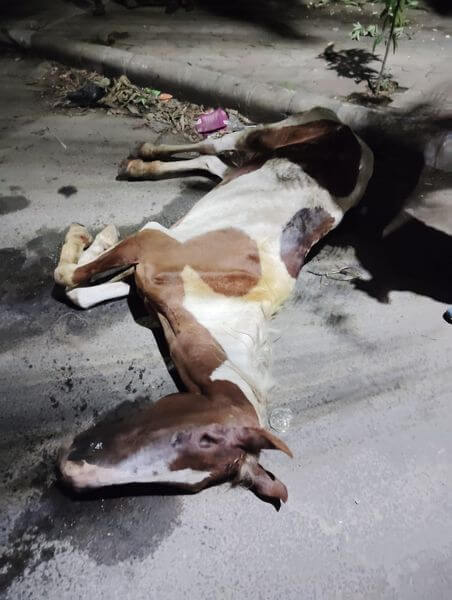Worked to Death: Two Horses Used to Haul Carriages in Kolkata Succumb to Abuse; FIR Filed by PETA India Supporter
Following a report on social media that a horse had collapsed in New Alipore, Kolkata, while being forced to haul a carriage even though they were visibly injured, malnourished, and extremely weak, PETA India sent experts to provide immediate care and treatment. The veterinarian and animal handlers were told by locals that the horse had been lying recumbent on gravel in the rain without shade or shelter for nearly two days. Upon examination, the horse was found to be suffering from a complete fracture in the right foreleg, ear infections, bloating, extreme weakness, and malnourishment. The horse was panting heavily, her spinal bones were visible, and she had open wounds. She had stopped eating and appeared to be severely dehydrated. Despite PETA India’s best efforts, as the horse had been left to suffer for so long, she died.
Just a day later at the Maidan in Kolkata, another horse succumbed to seemingly similar neglect and mistreatment. The horse, who was also visibly emaciated – their ribs and hip bones were prominent – and in poor health due to apparent long-term malnutrition and neglect, was found dead with maggot-infested wounds.
In response to the first incident, a first information report (FIR) was registered against the owner of the horse, Rahul Ghosh, and other unnamed persons under various provisions of The Prevention of Cruelty to Animals Act, 1960, and the Indian Penal Code, 1860. In response to the second incident, the PETA India volunteer who encountered the dead horse filed a complaint with Maidan Police Station. Post-mortem formalities are underway pursuant to which appropriate legal action will be taken based on the findings in the autopsy report.
In recent months, at least six other horses have died in Kolkata from neglect and abuse.
As evidenced by information documented by PETA India and CAPE Foundation, dozens of horses in the city have been found to be anaemic, malnourished, and chronically starved as well as with serious health conditions such as broken bones. Even though the horses are in poor condition and suffer from irreversible conditions as a result of being forced to work on hard roads, they are still made to pull heavy carriages. When they’re not working, there’s no relief, as they’re forced to stand in their own faeces without shelter.
Recently, the Calcutta High Court took serious note of recent incidents in which horses collapsed at the Maidan and elsewhere in Kolkata due to apparent weakness, malnourishment, and dehydration. The court also noted other issues such as the wide-scale prevalence of unlicensed hackney carriages in the city and the high rate of abandonment of ailing and unfit horses by their owners. The court directed the state government to come forward with a proposal for rehabilitating horse owners and providing them with an alternative livelihood to hauling tourists in victoria carriages so that “dispensing with the horse drawn carriages as done in Mumbai can be considered and examined for its feasibility”. In Mumbai, beautiful heritage-style e-carriages have replaced horse-drawn carriages.
The use of horse-drawn carriages in Kolkata has left horses injured, diseased, and malnourished and caused traffic accidents.
Join us in asking that the use of horses be replaced with eco-friendly electronic carriages: https://t.co/JlR778Za5C pic.twitter.com/CRi1kWuptt
— PETA India (@PetaIndia) September 10, 2022
The use of horses to pull carriages creates a risk of zoonotic disease such as glanders, which is almost always fatal in humans, especially when the animals are deteriorated and lack suitable veterinary care. They also pose a serious traffic hazard.
PETA India has repeatedly written to authorities in West Bengal, pleading with them to spare horses further suffering, and through a public interest litigation, the group hopes the Calcutta High Court will prohibit the use of horses for hauling carriages in the city.
Help Us End the Use of Cruel Horse-Drawn Carriages in Kolkata









